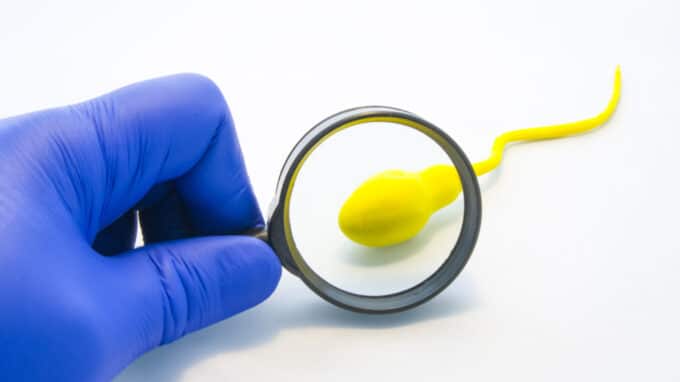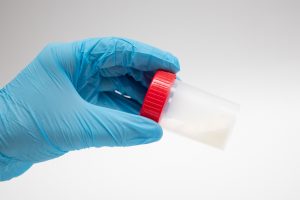Studies show that sperm counts have decreased massively in recent years. Many factors can play a role. Environmental toxins also have a negative effect on male fertility. It has been proven that air pollution can increase the risk of diseases such as obesity, diabetes and infertility, but the exact mechanism by which it can lead to these health problems has long been unknown. Researchers at the University of Maryland School of Medicine (UMSOM) have shown how air pollution reduces sperm count in mice by causing inflammation in the brain.
The Negative Effects of Air Pollution on Fertility
Scientists already know that the brain has a direct connection to the reproductive organs, which affect fertility and sperm count under stressful conditions. For example, emotional stress in women can lead to missed periods. However, the study, published in Environmental Health Perspectives, connects issues such as breathing polluted air, which can affect fertility.
About 92 percent of the world’s population lives in areas where airborne levels of fine particles less than 2.5 microns in diameter exceed minimum safety standards set by the World Health Organization. These particles can come from sources such as car exhaust, factory exhaust, wildfires, and wood stoves. In previous studies, some results have shown that mice exposed to air pollution did not always have inflammation of the testicles – the male reproductive organs that produce sperm – meaning another mechanism may have been responsible for the reduced sperm count. Knowing the direct connection between the brain and the sex organs, the researchers tested whether air pollution increased inflammation in the brain.
Inflammation Marker in the Brain Leads to Reduced Sperm Count
For the study, the researchers tested healthy mice and mice that lack an inflammatory marker in the brain called an inhibitor kappaB kinase 2, or IKK2 for short, which is found specifically in the neurons of the brain. They exposed both healthy and IKK2 mutant mice to filtered air or air pollution and then tested their sperm counts. The mice that were bred without the inflammatory marker IKK2 in their neurons, unlike the healthy mice, had no reduction in their sperm count when exposed to the polluted air.
The researchers then removed IKK2 from specific neurons to more accurately determine how air pollution led to lower sperm counts. They found that a specific type of neuron typically associated with sleep cycle and obesity was responsible for the reduced sperm count due to air pollution. These neurons are typically found in the hypothalamus, a part of the brain that controls hunger, thirst, and sex drive. The hypothalamus also works in conjunction with the brain’s pituitary gland, which produces hormones that communicate directly with the reproductive organs.
The results of the study show that the damage caused by air pollution – at least in terms of sperm count – could be reversed by removing a single inflammatory marker in the brains of mice, suggesting that therapies that counteract the harmful effects could soon be developed of air pollution on preventing or reversing fertility.
How Nicotine Reduces Sperm Count
Studies have repeatedly linked maternal smoking during pregnancy to decreased sperm count in male offspring. However, researchers at Lund University in Sweden have found that fathers also play a role. The researchers found that men whose fathers smoked at the time of pregnancy had half as many sperm as men whose fathers did not smoke, regardless of the mother’s nicotine exposure.
The study was conducted on 104 Swedish men between the ages of 17 and 20. After the researchers adjusted for maternal nicotine exposure, socioeconomic factors, and sons’ smoking habits, men with smoking fathers had 41 percent lower sperm concentrations and 51 percent fewer sperm than men with non-smoking fathers.
The biomarker cotinine is a metabolite of nicotine that can be measured in the blood. By measuring cotinine levels, the researchers can see if the parents smoke themselves or if they have been exposed to secondhand smoke. Many previous studies have shown that it is harmful to the fetus when the mother smokes, but in this study the link between the father’s smoking habit and the son’s sperm count is even clearer.
More DNA Damage in Sperm Cells
In contrast to the maternal egg cell, the father’s gametes divide continuously throughout life and mutations often occur at the very moment of cell division. It is known that tobacco smoke contains many substances that cause mutations, so it stands to reason that the gametes present at the time of conception have undergone mutations, passing on genes that lead to reduced sperm quality in the male offspring.
Most newly occurring mutations (known as de novo mutations) are inherited from the father, and there are also links between the father’s age and a number of complex diseases. In addition, researchers have observed that smoking is associated with DNA damage in sperm and that smokers have more DNA strand breaks. It has been reported that children born to smoking fathers have up to four times as many mutations in a given repetitive portion of DNA as children born to non-smoking fathers.






